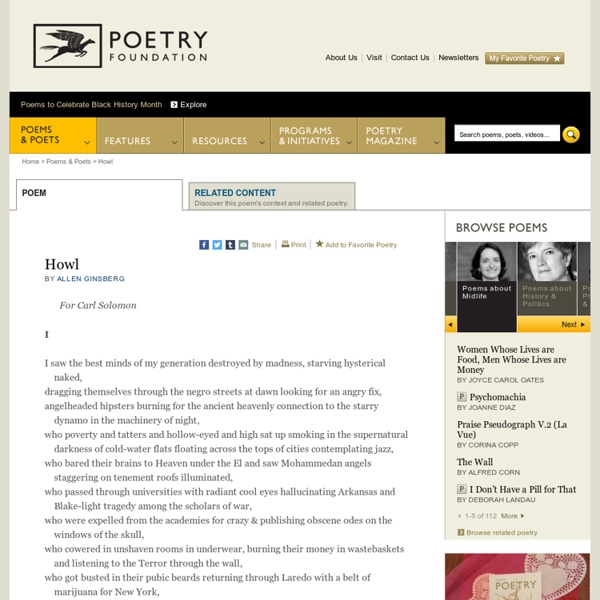Carl Solomon
Carl Solomon (March 30, 1928 – February 26, 1993) was an American writer. One of Solomon's best-known pieces of writing is Report from the Asylum: Afterthoughts of a Shock Patient. Biography[edit] Solomon was born in the Bronx of New York City. One of Solomon's best-known pieces of writing is Report from the Asylum: Afterthoughts of a Shock Patient. In the late 1960s, Solomon published two chapbooks of prose poems with Mary Beach's Beach Books, Texts & Documents, distributed by City Lights Books: Mishaps, Perhaps (1966) and More Mishaps (1968). Notes[edit] References[edit] Collins, Ronald & Skover, David, Mania: The Story of the Outraged & Outrageous Lives that Launched a Cultural Revolution (Top-Five Books, March 2013).
Peter Orlovsky
Peter Anton Orlovsky (July 8, 1933 – May 30, 2010) was an American poet and actor. He was the long time partner of Allen Ginsberg. Early life and career[edit] In 1953 Orlovsky was drafted into the United States Army for the Korean War at the age of 19. He met Ginsberg while working as a model for the painter Robert La Vigne in San Francisco in December 1954. With Ginsberg's encouragement, Orlovsky began writing in 1957 while the pair were living in Paris. In 1974, Orlovsky joined the faculty of the Jack Kerouac School of Disembodied Poetics at the Naropa Institute in Boulder, Colorado, teaching poetry. Death[edit] In May 2010, friends reported that Orlovsky, who had had lung cancer for several months, was moved from his home in St. Poetry[edit] His work has also appeared in The New American Poetry 1945–1960 (1960), The Beatitude Anthology (1965), as well as the literary magazines Yugen and Outsider. Filmography[edit] Notes[edit] References[edit]
‘The Darwin Poems’ » emilyballou.com
“Lean and warm and funny and beautifully written…A mad, compressed biography, in a luminous, fertile poetry, of a once-in-centuries genius.” -Luke Davies “Vivid, musical, sensuous and strong”-Adam Thorpe “These rich, wry poems bring us extraordinarily close to Darwin’s life and mind.” -Dame Gillian Beer, Author of Darwin’s Plots “A tidal imagination”-Matthew Hollis To lose your mother at the age of eight. To create a new kind of faith that will change the world. In 1832, Charles Darwin, a twenty-two year old naturalist and beetle-collector was offered a place on board a ship called the Beagle. Emily Ballou’s beautifully imagined verse-portrait of Charles Darwin’s life saves the man from the legend, bringing to light a fragile and deeply-felt humanity, capturing the textures of his work and dreams, the noise and touch of his wife and children, his inner doubts and questions. The Darwin Poems by Emily Ballou.
Allen Ginsberg
Irwin Allen Ginsberg (/ˈɡɪnzbərɡ/; June 3, 1926 – April 5, 1997) was an American poet and one of the leading figures of both the Beat Generation of the 1950s and the counterculture that soon would follow. He vigorously opposed militarism, economic materialism and sexual repression. Ginsberg is best known for his epic poem "Howl", in which he denounced what he saw as the destructive forces of capitalism and conformity in the United States.[1][2][3] In 1957, "Howl" attracted widespread publicity when it became the subject of an obscenity trial, as it depicted heterosexual and homosexual sex[4] at a time when sodomy laws made homosexual acts a crime in every U.S. state. Ginsberg was a practicing Buddhist who studied Eastern religious disciplines extensively. His collection The Fall of America shared the annual U.S. Biography[edit] Early life and family[edit] Ginsberg was born into a Jewish[16] family in Newark, New Jersey, and grew up in nearby Paterson.[17] New York Beats[edit]
Howl
"Howl" is a poem written by Allen Ginsberg in 1955, published as part of his 1956 collection of poetry titled Howl and Other Poems. Ginsberg began work on "Howl" as early as 1954. In the Paul Blackburn Tape Archive at the University of California, San Diego, Ginsberg can be heard reading early drafts of his poem to his fellow writing associates. "Howl" is considered to be one of the great works of American literature.[1][2] It came to be associated with the group of writers known as the Beat Generation, which included Jack Kerouac and William S. Burroughs.[1] There is no foundation to the myth that "Howl" was written as a performance piece and later published by poet Lawrence Ferlinghetti of City Lights Books. Background[edit] Allen Ginsberg wrote drafts of the poem "Howl" in mid-1954 to 1955, purportedly at a coffeehouse known today as the Caffe Mediterraneum in Berkeley, California. Ginsberg would experiment with this breath-length form in many later poems. Overview and structure[edit]



